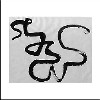Dustin Wong, "Seasons"
 Carelessness, especially the calculated variety, has become a default pose for the indie rocker of today. The music of Dustin Wong radiates the same casual sensibility, but that comes from his art rather than his manners. His first solo album, Seasons, is lazy, lighthearted, and scatterbrained, but Wong's musicianship welds its disparate elements into a unified piece of art.
Carelessness, especially the calculated variety, has become a default pose for the indie rocker of today. The music of Dustin Wong radiates the same casual sensibility, but that comes from his art rather than his manners. His first solo album, Seasons, is lazy, lighthearted, and scatterbrained, but Wong's musicianship welds its disparate elements into a unified piece of art.
Wong has already developed a singular style despite not being a veteran guitarist. Whether it’s heard in the primitivistic stadium-rock of his main band, Ponytail or in long-form minimalist compositions through his former membership in Ecstatic Sunshine, his playing is distinctive. Both bands are linked by Wong’s preference for jazzy chords and sudden bursts of rapid-fire strumming. Not limited to the guitar, he plays a multitude of instruments on Seasons while keeping to the same joyous, anarchic style.
Seasons is divided into four long suites; named (appropriately enough) after the seasons. These suites are nothing but collections of song fragments which bear little immediate similarity to each other. A fragment will consist of a simple riff or chord sequence repeated with little variation. Then at some arbitrary point, Wong will stop the piece, as if he’d forgotten an errand, and abruptly start another. Yet what we hear is not sloppiness, but the organic division of one idea and the next. And having so many ideas, Wong needs to quickly move along. He covers a vast amount of musical territory in that fashion. A swirling mass of looped synthesizers will follow a chiming instrumental on an acoustic guitar. A cloud of delayed autoharp will condense into the stiff ticking of a drum machine. First time listeners cannot guess what they will hear, only that it will be engaging. In Seasons, nothing sounds inevitable but everything sounds natural.
Like his bandmates in Ponytail, Wong cultivates a naïve, childlike style. On his own, he doesn’t practice the kind of grating babble-lyrics that accompany his band, but there is a mildly regressive quality to his solo-project. Some of that can be attributed to the unhinged shredding that he occasionally breaks into. These technical passages thankfully aren't irritating because they are brief and exuberant, not plodding and pretentious. Wong isn’t trying to impress but to entertain.
The other part in Wong’s naïve style comes from the album’s bright, drifting keyboard instrumentals; their lilting arpeggios recall the gentle cloud-world soundtracks of Super Mario Bros 3. Like the composers for Nintendo, Wong transcends the expressive limitations of primitive digital keyboards through melodic complexity. His tinny synthesizer tones sway in counterpoint like images in a cybernetic daydream. In both instances, the cuteness in Wong’s music seems genuinely idiosyncratic. Unlike the slick, well socialized aesthetes of contemporary indie-pop, he does seem like a dork and comes off the better for it.
It may appear piecemeal but Seasons reveals its merit when heard in its entirety. Wong’s distinctiveness as a musician remains intact through the album’s wild variations of mood and style. Unlike most practitioners of modern rock, he doesn’t need a predetermined mode to compensate for a lack of skill or individuality (as opposed to individualism). The unity of Seasons is like the unity of a person: various but still recognizable. Time softens the discord of its assorted parts and eventually a clear picture of the artist’s mind will emerge.
samples:



